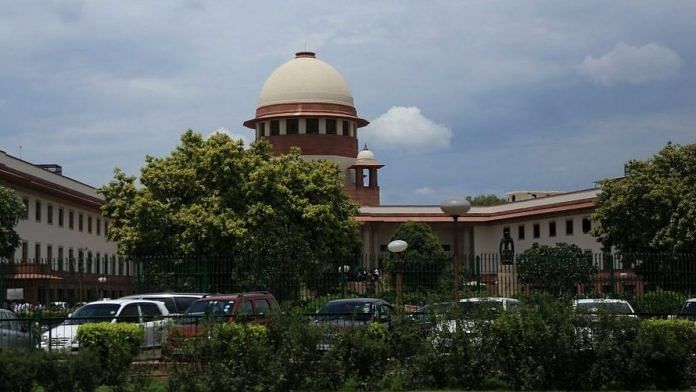India’s Supreme Court collegium comprising of Chief Justice Ranjan Gogoi and justices A.K. Sikri and S.A. Bobde recently considered the names of lawyers recommended for appointment as judges of Allahabad High Court on 12 February. The collegium decided to relax the mandatory criteria about “professional income” of some recommended candidates.
Under the new relaxed system, the standard for prescribed minimum income limit of the candidates has to be less than Rs 7 lakh per year. This decision is a clear case of overreach by the collegium, especially since it flies in the face of all logic as well as settled law.
It will be hard to find lawyers practicing in high courts with 10 years’ experience whose annual income is less than Rs 7 lakh per year (or roughly Rs 60,000 per month).
The Supreme Court collegium’s relaxation will be applicable only to “a reasonable extent in cases where such recommendees belong to categories of SC/ST/OBC or represent Government in their capacity as Standing /Panel Counsel before the Courts”.
Ordinarily, such a decision would have been questioned by the Centre, particularly Prime Minister Narendra Modi’s government, which has been rejecting names recommended by the collegium often on flimsy grounds. But in this case, the Modi government is not likely to do any such thing.
Also read: How three key Supreme Court judgments shook the faith of SCs, STs and OBCs in one year
The origin of the issue
On 10 March 2017, the five then senior-most judges of the Supreme Court – CJI J.S. Khehar and justices Dipak Misra, Jasti Chelameswar, Ranjan Gogoi and Madan B. Lokur – finalised the new memorandum of procedure (MoP) as per the directions issued by the Constitution bench in the National Judicial Appointments Commission case: Supreme Court Advocates-on-Record Association versus Union of India.
The new MoP was finalised after several rounds of meetings of the five senior-most judges, and every clause of the new MoP was unanimously agreed upon. Incidentally, the current CJI Ranjan Gogoi was also a signatory to the new MoP.
While dealing with the issue of eligibility criteria for an advocate to be considered for elevation to the bench, the new MoP said: “An advocate should be an income tax assesse, for the preceding ten years, provided he/she is not exempted from paying Income Tax under the provisions of the Law. He/she should have a minimum average net professional income of Rs 7 lakhs per annum or more during the preceding five years”.
The Modi government, which had also conveyed its views on the clauses of the proposed MoP, wanted the income criteria to be fixed at Rs 5 lakhs for smaller high courts like those in the northeast and Rs 10 lakh for larger courts like in Allahabad, Bombay, Delhi, Kerala, Tamil Nadu, etc.
The five judges, however, chose to fix the criteria at Rs 7 lakh for all courts – large or small.
The judges also resolved that any future tinkering with the clauses of the MoP would have to be “unanimously” cleared by the five senior-most judges of the Supreme Court.
The new MoP has seemingly still not been notified by the Centre, but the collegium has been making recommendations based on the clauses of this MoP only.
Also read: Why All India Judicial Service and reservation in judiciary won’t be a reality in 2019
The two problems
How can three judges tinker with the MoP clauses on their own without getting the clearance from the five senior- most judges to dilute their criteria?
CJI Ranjan Gogoi was himself a part of the set up that drafted the clauses of the MoP, and he was aware of this requirement.
And, how did Allahabad High Court – for which the dilution was considered – become a ‘small’ high court?
But, there’s another, larger problem with the relaxation. As I wrote last month, reservation of any post of judges of the Supreme Court and the high courts for SC, STs, OBCs and minorities is Constitutionally impermissible. Then, how can the collegium relax the income criteria to give special benefits to any class of people?
Also read: SC judges elevation row: Collegium still opaque under CJI Gogoi or is this an aberration?
Not a fix for representation
While there is no doubt that our higher judiciary has an extremely poor representation from among the marginalised sections of society, it is doubtful that such a non-transparent process of relaxation of income criteria will actually help their cause.
It would be an interesting exercise to find out how many of these 10 names cleared by the SC collegium, after they relaxed the income criteria, actually belong to “categories of SC/ST/OBC”.
As for those whose don’t fulfil the income criteria because they serve the “Government in their capacity as Standing /Panel Counsel before the Courts”, it is a specious argument. After all, these are not full-time employments and, in most cases, these lawyers are free to continue their private practice while taking care of government cases, if and when they are assigned to them.
Like several recent instances, the latest collegium decision and the reasoning behind it leaves a lot of scope for questioning – the reason why the collegium system is itself being questioned.




Calling people with guaranteed quotas, relaxations, & preferential treatment in school/college admissions, jobs, scholarships, parliament, legislatures, panchayats etc, “marginalised” is the ultimate lie, in a nation whose motto is “Satyameva Jayate”. This routine nonsense of refering to people with of supremacist rights as “marginalised” has crossed all limits of fiction.